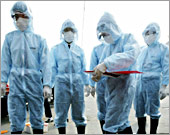Hong Kong reports new SARS suspect
Hong Kong has reported a new suspected case of SARS in neighbouring Guangdong province as authorities there stepped up a campaign on Sunday to exterminate rats believed to carry the SARS virus.

However, Beijing said in its daily report that no new suspected or confirmed cases of Severe Acute Respiratory Syndrome (SARS) were reported from 10am Saturday to 10am Sunday.
The case announced in Hong Kong would be the third suspected or confirmed case reported in southern China since SARS was said to have been contained last July after killing nearly 800 people worldwide, most of them in Asia.
Dr. Thomas Tsang told reporters in Hong Kong on Sunday: “Around noon today we had a verbal notification from Guangdong about a new suspected case of SARS.”
Tsang, a Hong Kong Department of Health consultant in Community Medicine, said the new case involved a 35-year-old man.
A 20 year-old waitress remains in hospital after being confirmed a suspected SARS case last week while the first confirmed SARS victim in six months, a 32-year-old man in Guangdong, was released from hospital last Thursday after recovering.
Sunday’s conflicting reports on the new suspected case could be a sign that the mainland reporting system remained confused and slow, World Health Organization (WHO) officials said.
Slow response criticised
China was heavily criticised for its slow response to the SARS outbreak that began in Guangdong in November 2002.
 |
|
China has slaughtered 1000s of |
Tsang said: “Guangdong are investigating this case as to how he got this infection which is right now listed as a suspect case.”
“I think at this time of the year, having sporadic cases of SARS appearing in Guangdong province I think is not very surprising,” he said.
Guangdong authorities were looking into possible causes of infection, but at this stage it was not believed to be linked to animal handling, Tsang said.
But Chinese health officials contacted in Guangdong refused to independently confirm the new suspected case.
WHO officials in Guangzhou, the capital of Guangdong, said they were awaiting confirmation of the case from health officials.
“With regards to the Beijing report, there’s the problem,” WHO spokesman Bob Dietz told AFP.
“That is where the discrepancy could build up … obviously there is a time lag in communication.”
Mandated reports
WHO team leader Robert Breiman stressed that timely reporting was crucial to preventing a further outbreak of the disease.
“This is the way we can all assure that we’re on top of the information, that there is appropriate contact tracing and no secondary spread.”
|
SARS triggered a worldwide health crisis after emerging in Guangdong, causing 774 deaths from more than 8000 infections and causing extensive damage to regional economies |
China’s Ministry of Health has mandated that all reports on the SARS outbreak must be announced by central health authorities.
Breiman added that while one confirmed and two suspected SARS cases did not yet constitute a serious public health risk, there was concern given the outbreak last year.
SARS triggered a worldwide health crisis after emerging in Guangdong, causing 774 deaths from more than 8000 infections and causing extensive damage to regional economies.
China worst hit
China was worst hit by SARS, which infected 5327 people nationwide and killed 349.
Health and sanitation officials on Sunday stepped up a province-wide “patriotic campaign” to exterminate rats, with a report saying they would put 100 tons of rat poison on the streets of Guangzhou, to the alarm of the public.
Officials were also expected to continue the cull of the civet cat, an animal highly suspected as the origin of the SARS virus, as only some 3900 of a targeted 10,000 had been killed by Saturday, the final day of a province-wide kill.
Researchers have isolated a virus in the civets that is nearly 100% identical to9 the coronavirus that causes SARS.